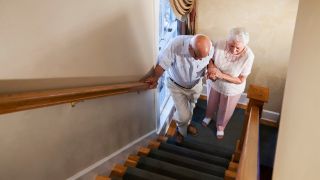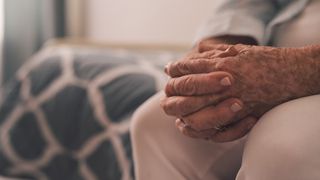According to statistics released by the Administration on Aging in 2016, around 20% of men and 36% of women over the aged of 65 live alone in the United States. The equates to around 13.3 million elderly people, and that figure is growing as people are now living longer and more independently for longer.
There are many reasons why a person might be living alone in their later years. The most common include the death of a spouse or partner, separation from a partner, or simply that a person has lived alone for most of their adult life and would prefer to continue doing so.
Independence is important, but so is making sure that you're aware of the possible risks involved with living alone in your later years. These needn't require big lifestyle changes from you, or expensive modifications to your living space. Rather, a little awareness of the various risks and how you can limit them is the best approach to helping you live more enjoyably on your own well into your twilight years.
Here we look at the biggest risks facing seniors who live alone, and what steps you can take to either avoid or temper them.

1. Increased risk of medical emergencies
Again, we are all at risk of becoming ill or falling over and injuring ourselves on a daily basis, but research tells us that the risk of falling and experiencing injury increases in our older years. It says that falls are the leading cause of injury-related visits to emergency departments in America, and they are the primary etiology of accidental deaths in persons age 65 years and over.
While prevention is key to ensuring your mobility remains good - consider using one of the best fitness trackers to motivate you to stay active - there may be other factors increasing your risk of falling at home. This could include poor eyesight, various health conditions, or even living in a home laden with trip hazards.
In addition, your chances of having to take a prescription medication increases with age, so it's important to get organized with your medicine to ensure you avoid any accidental overdoses. A pill box, marked with each day of the week, is a good idea as you can organize your pills by each week day. If you have ongoing medication costs, take a look at our guide to the best Medicare Part D plans to see how they could help.
What you can do:
If you live alone, using one of the best medical alert systems could create greater peace of mind for you and your family. If you fall or have a medical emergency, a medical alert system enables you to quickly access the help you need. As with the best fall detection systems, these devices use built-in sensors to get to know your daily routine and level of mobility.

So if you become ill or fall in your home, the device will connect remotely to a base unit in your home, which then calls a 24/7 call centre staffed with medically trained staff who can get you the right help. These systems will also call your 'In Case of Emergency' contacts so that they know you need assistance.
If poor eyesight is your biggest issue, book an eye exam and upgrade your eyewear so that can see properly again. You can even shop for these from home, taking your pick of the best eyeglasses online or the best contact lenses online if you prefer.
2. More likely to experience social isolation
A study of over 6,500 elderly people by the University College London suggests that social isolation significantly reduces your lifespan, posing both mental and physical health issues. The study suggests that social isolation doesn't just effect mental health, it also increases your risk of heart disease, infectious illness, cognitive deterioration, and high blood pressure.
It's important to note that the study makes a distinction between social isolation and loneliness, though loneliness is a symptom of social isolation. If you're not actively interacting with family, friends and your community in general, you might be socially isolated.

What you can do:
Arrange regular catch-ups with family and friends in person, as this will give you a bigger wellness boost than speaking to people via text, instant messaging, phone or email. Those are all effective ways of keeping in touch, but in person is best.
If you don't have many friends or family around you, consider volunteering somewhere in person, or joining a local club that's of interest to you and your hobbies.
3. Increased risk of depression and anxiety
This isn't exclusive to seniors living alone. All of us, regardless of age and living circumstances, are at risk of developing anxiety and depression at various stages of our lives. However, some people are more susceptible than others.
According to research, older adults living alone are more likely to experience depression than those who live with a spouse. It's a similar story with anxiety, which presents itself in symptoms such as insomnia, heart palpitations and muscle tension. Anxiety could also be caused by feeling unsafe when living alone.
What you can do: If you're experiencing symptoms of depression or anxiety, speak to your doctor as soon as possible. They are trained to advise you on what treatments are available, and on how to manage anxiety in your daily life.
Ensuring you have a good support network of trusted friends or neighbors nearby will also ease any anxiety you may be feeling over living alone. Sometimes, having someone who can regularly check in on you can make a big difference. Installing one of the best home security systems is another way to ensure your safety at home.

4. Less access to nutritious foods
According to a study published in the National Library of Medicine, elderly people who live alone are at a much higher risk for malnutrition, and that malnutrition can also be affected by social isolation and loneliness.
The study compared the diets of seniors who lived alone compared to the diets of those who still lived in family environments. Researchers found that people who live alone are at increased risk of malnutrition because they often reduce the number of daily meals they eat, or they significantly lower their daily intake of protein, fruits and vegetables.
Finances are often a major factor here, with large swathes of elderly Americans often living below the poverty line.
What you can do:
Eating well needn't cost the earth, and with some careful budgeting and batch cooking you could make several meals out of a handful of fresh, nutritious and cheap ingredients. Take a look at our guide to healthy eating at home for a list of cheaper foods, that also last well, that are packed with nutrients. These have been recommended by a registered dietician.
Proper nutrition plays an important role in helping you to live as well as you can for as long as possible, so if this is something you could potentially overhaul in your life, it's a great change to make.

5. House chores prove more challenging
Regardless of how well we maintain our mobility, the truth is that certain physical tasks become more difficult as we get older. Various health conditions can often compound these, so throwing the vacuum cleaner around your home may not be as easy as it was ten years ago.
However, keeping your home clean and clutter free is important to your wellbeing when living alone. Firstly, by cleaning regularly you are killing any virus particles that may be collecting on various surfaces in your home. Secondly, by clearing away clutter you are removing any potential trip hazards.
Not to mention that living in a clear and clutter-free environment will help you to feel much happier and more relaxed than a home filled with dirt and debris.
What you can do:
If you need a hand with certain chores, consider asking a trusted friend, family member or neighbor if they could help you with household work that you find physically taxing.
For those of you who have the budget and enjoy using technology, using one of the best robot vacuums means that you won't have to do any vacuuming yourself - your robot helper will handle it all on both hard floors and carpet.
Learning how to clean a mattress properly can also help yours last longer, and could be as simple as vacuuming the surface of the mattress and letting it air without any bed sheets on for a few hours.
Ultimately, while living alone in your elder years does present certain challenges and risks to your physical and mental health, with awareness and proactivity there is no reason why you can't limit your exposure to them.


